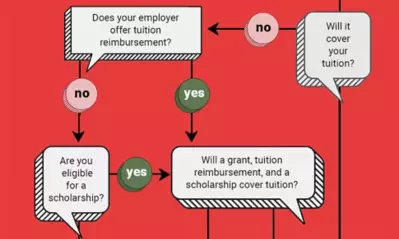How to write a personal statement for grad school

Written by Michael Feder

Reviewed by Marc Booker, PhD, Vice Provost, Strategy

Deciding to pursue a graduate degree is a big step and can lead to exciting career opportunities . However, before you can earn a graduate degree, you must apply to graduate school.
Applying to graduate school may require numerous steps, such as filling out forms, obtaining copies of your transcripts, asking for letters of recommendation and writing a personal statement.
Your personal statement is your chance to give the admissions committee a deeper look into who you are as a person beyond your academic and professional accomplishments. A strong personal statement can potentially improve your chances of being admitted to a graduate school that can help you reach your goals.
Is a personal statement required?
It depends on the institution, but many ask for a personal statement. Some schools even provide questions and prompts for you to address when crafting your statement.
If a graduate program asks for a personal statement, assume it is a required part of the application process. Failing to include your personal statement could result in rejection or a delay in being admitted.
Questions to ask yourself
Before you start writing, take a moment to reflect on a few key questions. These questions will help you uncover the main theme and important points to include in your personal statement.
- Why do I want to return to school?
- What specifically about my skills, experiences and personality make me a good candidate for this program?
- Why did I choose this field of study? What do I enjoy about it?
- What obstacles have I faced that shaped who I am as a person? How do those struggles motivate me to pursue this degree?
- What would make me a unique applicant who would add to the student body and diversity of thought at the institution?
By honestly answering these questions, you can gain a better understanding of what you hope to achieve by going to grad school and how you would be a good addition to the program you are applying for.
Important components of a personal statement
A personal statement should have several key components. They are:
- Your personal journey and obstacles: Outline the major life events that brought you to this point and how those events affected your decision to pursue graduate school.
- Your understanding of the program and why you chose to apply: Research the program and showcase your knowledge in your personal statement by expressing why this specific program feels right for you.
- Your reasoning for pursuing a graduate degree: Show the admissions committee that earning a graduate degree is a vital part of reaching your goals.
- Specific examples of past work: Provide examples of your work and experiences that demonstrate why you would make a great addition to the program.
- How you will contribute to the school’s learning community: Going to graduate school is not all about what you can obtain, but also how you can contribute as a student and alumnus to the institutional community. Provide information on what makes you unique and how you can give back.
Tips for writing your personal statement
Your personal statement is sometimes the admissions committee’s only chance to get to know you beyond your transcripts and resumé. Tips for writing an effective and impactful personal statement include:
- Research the program: Mention specific professors you want to work with and specific classes you are interested in.
- Hook your reader: While you want your entire statement to be strong, it is especially important that your first sentence is powerful enough to engage your reader.
- Choose a few main points: Don’t write a complete autobiography. Choose a few main points and dive deeply into each one.
- Proofread and edit: A statement with typos will give a poor first impression. Be sure your statement is grammatically correct and well written. Don’t just rely on spell-check; check it a second or third time yourself. Ask a friend or professional mentor to look it over for you.
- Use your own voice: Although proofreading and clarity are essential, avoid adjusting the tone and words to oversanitize your language so that it no longer represents the essence of “you.” Admissions professionals review hundreds of applications a year, and losing your personal voice to overediting can decrease the impact of your personal statement.
Following these tips will help you write a compelling personal statement that demonstrates you have given this decision careful consideration, you pay attention to details, you have strong writing skills, and you have confidence in your future performance in the program.
Personal statement examples
When discussing a past obstacle you overcame, you should explain how the obstacle helped prepare you for grad school. For example:
[The obstacle] taught me more about myself and showed me that I have the strength to do hard things in life. In overcoming it, I realized I have the power to take charge and reach my goals.
When discussing your personality traits, give specific examples of how those traits will help you in your specific course of study:
My insatiable curiosity has helped make me a thorough researcher and an avid reader. I want to know as much as I can about [your field of study] because learning is a part of who I am.
Further requirements for applying to graduate schools
Beyond writing your personal statement, you may be asked to complete several other requirements to apply to graduate schools, including:
- Transcripts from your undergraduate degree: To be accepted for a graduate program, you will need to complete an undergraduate degree
and submit your transcripts with your application.
- Letters of recommendation: Letters of recommendation from two or three professors, mentors and employers might be required.
- Testing: Some grad schools require that applicants submit their GRE score
or GMAT result, but this may not always be the case.
- Application forms: Make sure all of your forms, which will most likely be digital, are filled out with the correct information.
- Statement of purpose: Some schools ask for a statement of purpose, which is different from a personal statement. The statement of purpose is more tactical in nature and should speak about your accomplishments and the level of work you plan to contribute on a functional basis.
Each piece of your application comes together to create a full picture of who you are, where you have been and where you are going.
Statement of purpose vs. personal statement
As mentioned, when applying for graduate school you might need to write both a personal statement — or a personal history — and a statement of purpose. The personal statement focuses on your personal journey, your goals, past obstacles, and the skills and personality traits you have that make you a good match for the specific program.
A statement of purpose has more of a professional and academic focus. You will need to outline your professional and academic work experiences, awards, publications and achievements. You will also need to outline your goals for your study within the program, the mentors you hope to work with and the focus of your studies or thesis.
The personal statement lets the admissions committee get to know you, and the statement of purpose lets them know the kind of work they can expect from you if you are accepted.
Further resources for applying to graduate school
If you are starting the application process for your graduate program of choice, then using all the resources at your disposal can improve your chances of being accepted. These resources include:
- Mentors: Past professors and mentors can provide guidance and letters of recommendation to bolster your application.
- Your undergraduate university: If you are a current student or a recent graduate, your alma mater may have resources, such as a writing center, that can help with grad school applications.
- The admissions office of the graduate program: The school you are applying to will have information about the application process. Make sure you research information online, follow instructions exactly and, if necessary, contact the admissions office for further clarification to improve your chances of acceptance.
Whether you have been dreaming of graduate school for 20 years or you are close to graduating with your bachelor’s degree and looking at the next step, attending graduate school can change your life. From increased knowledge and expertise to a wider range of employment opportunities, earning a graduate degree can help you reach your professional and personal goals.
Graduate programs at University of Phoenix
University of Phoenix (UOPX) offers a wide range of online master and doctoral degree programs.
- Master degrees: UOPX currently offers 27 graduate degree programs in education, business, health administration, nursing, data science and more. To learn more, visit https://www.phoenix.edu/online-masters-degrees.html
.
- Doctoral degrees: UOPX currently offers the following five doctoral degrees: Doctor of Business Administration, Doctor of Education, Doctor of Health Administration, Doctor of Management and Doctor of Nursing Practice. To learn more, visit https://www.phoenix.edu/online-doctoral-degrees.html
.

ABOUT THE AUTHOR
A graduate of Johns Hopkins University and its Writing Seminars program and winner of the Stephen A. Dixon Literary Prize, Michael Feder brings an eye for detail and a passion for research to every article he writes. His academic and professional background includes experience in marketing, content development, script writing and SEO. Today, he works as a multimedia specialist at University of Phoenix where he covers a variety of topics ranging from healthcare to IT.

ABOUT THE REVIEWER
Dr. Marc Booker, University of Phoenix Vice Provost for Strategy, has more than two decades of experience working with online and distance education students at the post-secondary level. He currently oversees critical path academic initiatives to improve the student experience. Dr. Booker is a regular speaker, author and contributor to national higher education associations.
This article has been vetted by University of Phoenix's editorial advisory committee.
Read more about our editorial process.
Read more articles like this:


